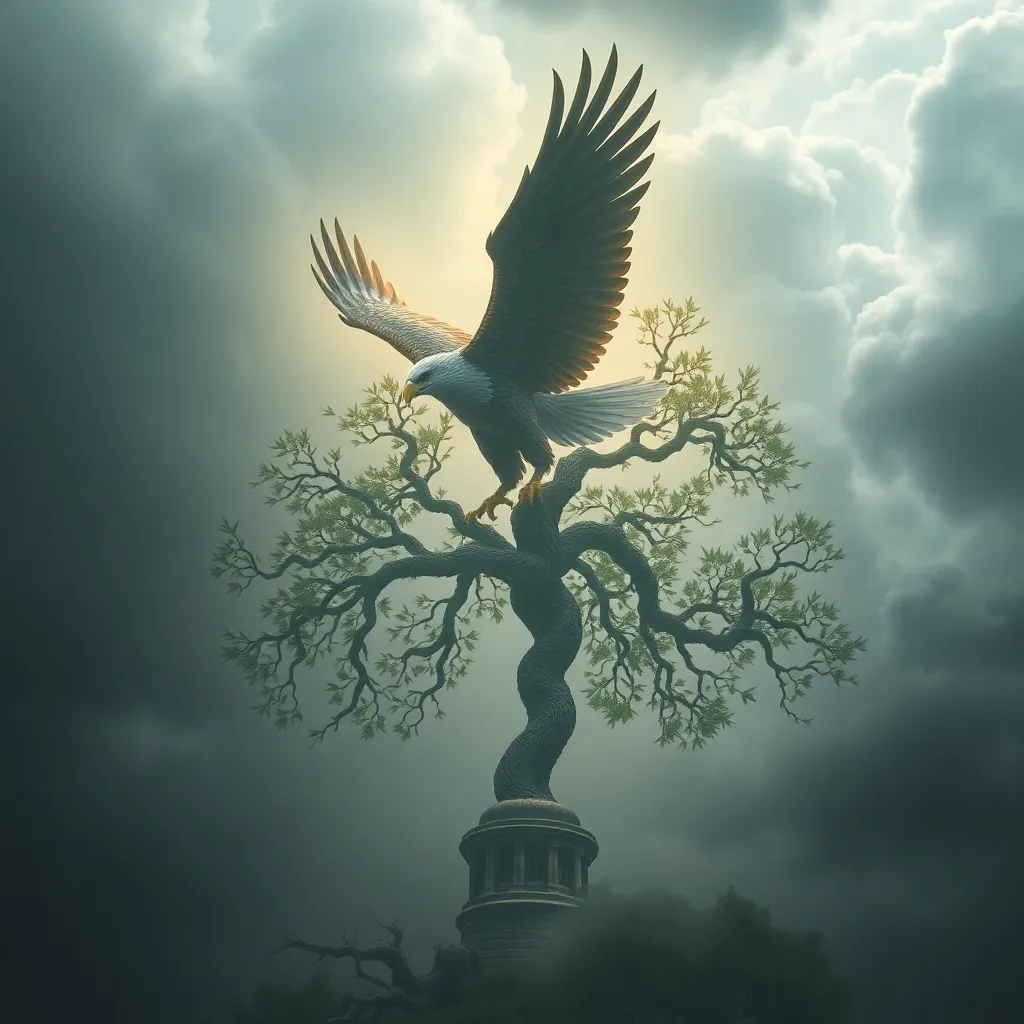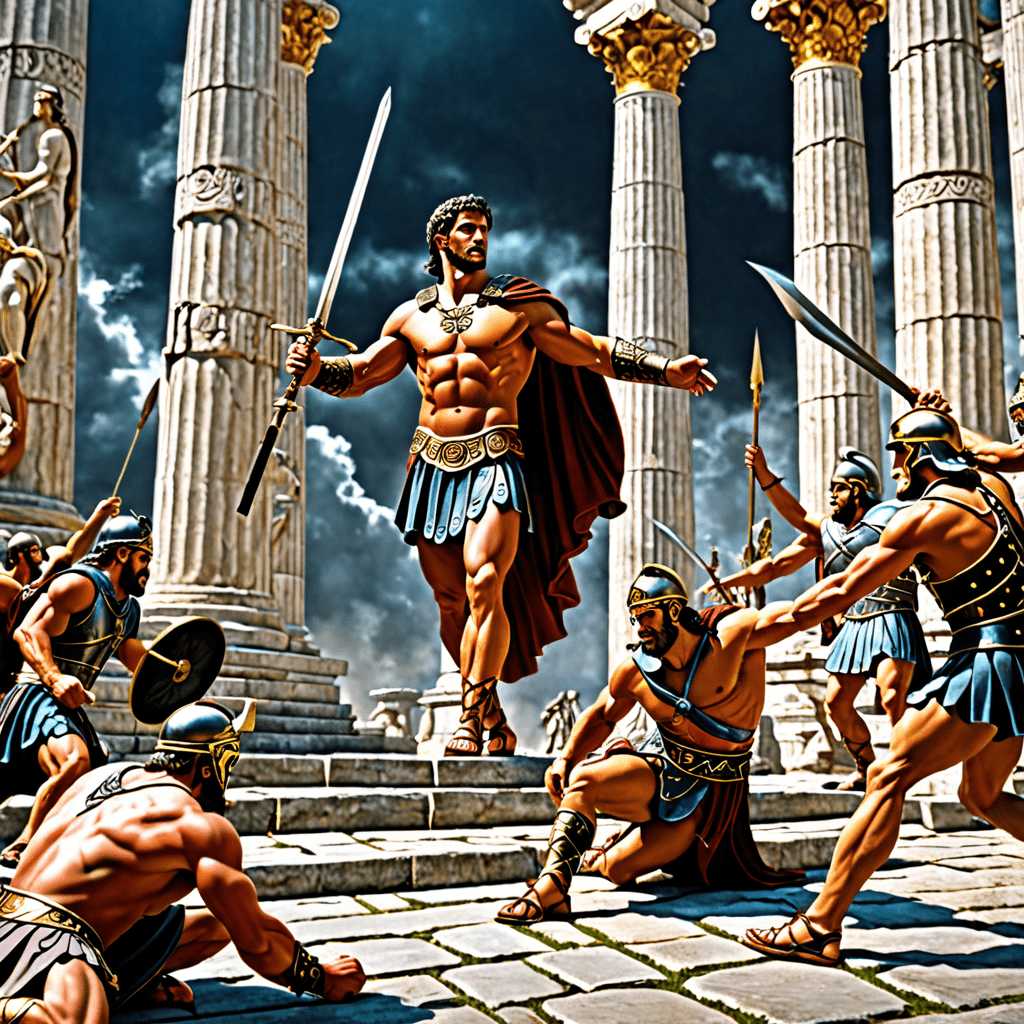The Olympian Connection: Zeus, the Eagle, and the World Tree
I. Introduction
Greek mythology serves as a cornerstone of Western culture, providing rich narratives that explore the human experience, the divine, and the natural world. Through captivating stories, ancient Greeks sought to explain phenomena, impart moral lessons, and connect with their gods. At the heart of this mythology stands Zeus, the chief deity whose influence permeates various aspects of life and nature.
This article delves into the symbolism of Zeus, the eagle, and the World Tree, exploring how these elements interconnect to form a cohesive mythological framework that reflects the values and beliefs of ancient Greek society.
II. The Role of Zeus in Greek Mythology
Zeus, often depicted as a robust figure wielding a thunderbolt, reigns as the ruler of Mount Olympus, the abode of the gods. His authority is unparalleled in the pantheon, as he governs not only the heavens but also the earth and the underworld. As the god of sky and thunder, he embodies the forces of nature and justice.
Key attributes and powers of Zeus include:
- Master of the skies and storms
- Protector of the weak and upholder of justice
- Father to numerous gods and heroes
The importance of Zeus in Greek mythology is further underscored by his role in numerous myths, where he intervenes in the affairs of mortals and gods alike, ensuring that order prevails over chaos.
III. The Symbolism of the Eagle
The eagle, often regarded as a sacred animal of Zeus, symbolizes strength, power, and freedom. This majestic bird is not only a representation of Zeus’s might but also serves as a messenger between the divine and mortal realms. In many artistic representations, the eagle is depicted soaring high above, embodying the connection between the earth and the heavens.
Throughout art and literature, the eagle appears in various forms:
- In ancient pottery, often shown alongside Zeus
- In literature, appearing in myths where it delivers messages or carries out Zeus’s will
This avian symbol reinforces the idea of divine authority and the freedom associated with the sky, further enhancing Zeus’s formidable presence in mythology.
IV. The World Tree in Mythological Context
The World Tree is a significant concept found in many cultures, representing the interconnectedness of all life. It serves as a cosmic axis, linking the heavens, earth, and underworld. In Greek mythology, the World Tree can be connected to Gaia, the personification of the Earth, and symbolizes the cosmos’s harmony.
Key aspects of the World Tree include:
- Symbol of life and growth
- Representation of interconnectedness among all beings
- A metaphor for stability and balance in the universe
The World Tree embodies the deep-rooted belief in the cyclical nature of life, echoing themes of birth, death, and rebirth prevalent in Greek thought.
V. Interconnections Between Zeus, the Eagle, and the World Tree
The interconnections between Zeus, the eagle, and the World Tree are woven throughout Greek mythology, revealing a complex tapestry of relationships that symbolize power, authority, and the natural order. Mythological narratives often depict Zeus and the eagle in tandem, emphasizing their shared significance.
Some notable connections include:
- Myths where Zeus transforms into an eagle to pursue lovers or punish wrongdoers
- The eagle’s role as a messenger, delivering Zeus’s commands to both gods and mortals
- The World Tree as a metaphor for Zeus’s dominion over the universe, representing the balance he maintains across realms
Through these narratives, the interconnectedness of these symbols becomes apparent, illustrating a cohesive understanding of power and nature in Greek mythology.
VI. Comparative Analysis with Other Mythologies
Zeus shares remarkable similarities with thunder gods from other cultures, such as Thor in Norse mythology and Indra in Hindu traditions. These deities embody similar attributes of strength, authority, and control over storms and skies.
In addition, the eagle appears in various cultural mythologies:
- In Native American cultures, the eagle represents spiritual growth and freedom.
- In Egyptian mythology, the eagle is associated with the goddess Ma’at, symbolizing truth and justice.
Furthermore, the concept of the World Tree is present in Norse and Mesoamerican traditions, where it represents the axis mundi, connecting different realms of existence. Such cross-cultural parallels enhance our understanding of these symbols and their universal significance.
VII. The Modern Legacy of Zeus, the Eagle, and the World Tree
The influence of Zeus, the eagle, and the World Tree continues to resonate in contemporary culture. These symbols appear in literature, film, and art, often representing themes of power, nature, and the struggle for balance in a chaotic world.
Examples include:
- Adaptations of Greek myths in popular films and novels, where Zeus often plays a pivotal role.
- Artworks that use the eagle as a symbol of freedom and strength.
- Discussions in environmental discourse that draw parallels between the World Tree and the interconnectedness of ecosystems.
The ongoing relevance of these mythological elements in modern discussions highlights their enduring impact on human thought and creativity.
VIII. Conclusion
In summary, the connections between Zeus, the eagle, and the World Tree reveal a rich tapestry of symbolism that underlines the values and beliefs of ancient Greek culture. These elements serve as powerful representations of authority, freedom, and interconnectedness, emphasizing humanity’s relationship with the divine and the natural world.
As we reflect on the significance of these symbols, it becomes clear that they continue to influence modern culture, reminding us of the timeless themes present in mythology. Ultimately, the interconnectedness of these mythological themes invites us to explore our own relationships with power, nature, and the universe.



